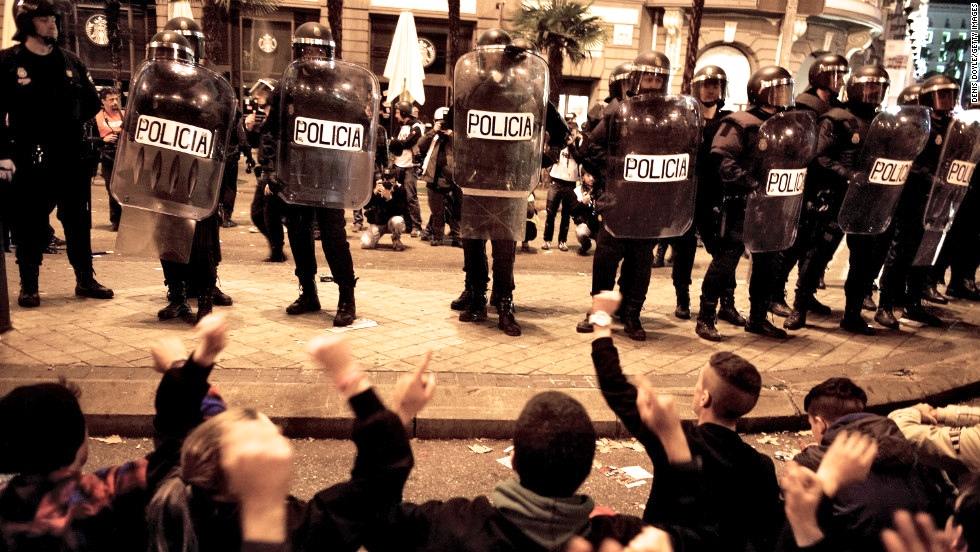The Transnational Institute hosted in Amsterdam a European strategy meeting in October which brought together different European social movements on the front lines of resistance against the neoliberal E.U. austerity regime.
Austerity, privatization and attacks on social rights, imposed by the European Commission, have become a reality for people across Europe. While there have been many impressive struggles at the national level - especially in Southern Europe - European coordination is still weak apart from sporadic days of joint action.
In recent years European social movements have organized numerous meetings to analyze the situation. However, it also became clear that European social movements required a common strategy. Following the results of the E.U. economic governance assembly organized in the Alter Summit in Greece in June, the Amsterdam strategy meeting was called to coordinate European struggles against the Troika's imposition of neoliberal policies under the new E.U. economic governance regime.
A European Square
Coming from all over Europe, 60 organizations and networks from well-established groups with a long history to the most recent social movements, gathered over three days in Amsterdam to share stories of successful resistance and to shape common campaigns and strategies.
There was a strong commitment to apply the lessons learned during the recent camps and occupations. The proposed agenda was modified along the lines of a general assembly, where all the participants had their say through an open and horizontal process. Different working groups were created to further develop the topics that were considered most important for the months to come: Democracy and the commons, Troika and Debt, the Competitiveness Pact, and the European elections.
As a result, four different initiatives were jointly developed at the end of the strategy meeting:
-
Troika Party: Under the slogan of "Democracy is not competitive", this communication campaign organized around a fake political party will expose the role of the Troika in European decision making, and the real discourse behind the Troika policies.
-
Competitiveness Pact: This new piece of E.U. legislation under discussion is the new framework to push further austerity measures and weakening of labor laws. This campaign will not only oppose this pact but also will say "Basta!" to the principle of competing in a race to the bottom.
-
Mapping the alternatives: A newly created online directory will map all the European initiatives that are protecting the commons and developing solidarity economies. It will make them visible and demonstrate that there are real alternatives to neoliberal policies.
-
Week of action during the European elections: The European elections were identified as a key moment to mobilize European social movements against the neoliberal E.U. crisis regime. De-centralized but coordinated actions will be promoted all over Europe.
Encouraging a Pan-European Response
The following meetings provided important inputs and ideas to the Amsterdam gathering: the Alter Summit Assembly in Brussels last October, the Agora99 meeting in Rome last November, and the same month, an International Blockupy Conference in Frankfurt.
From Transnational Institute we thank all those organizations, groups and activists that made this strategy meeting a success. We start 2014 strengthened and more coordinated, the European convergence of social movements is a fact.
Groups Present at the Event Included:
Spain: Citizen Debt Audit Platform (PACD), Mesa Defensa Sanidad Pública Madrid LA PAH (Platform of affected by mortgages), Plataforma por un nuevo modelo energético (PX1NME), Ecologistas en Accion Attac Spain
Portugal: Precários Inflexíveis Que se lixe a Troika
Greece: Greek debt audit campaign (ELE), No Debt No Euro, Micrópolis, Thessaloniki People’s University of social and solidarity economy, Initiative of solidarity with VioMe occupied factory, Initiative 136 for social control of water
Germany: Attac Germany, Interventionistische Linke / Blockupy, Metal Workers Union Berlin, Blockupy, Rosa Luxembourg Foundation, European Occupy Central Bank
Netherlands: SOMO, Reinform Social Development Cooperative, International Migrant Platform, 15M Amsterdam, Nijmegen Social Forum, Ander Europa, Social Development Cooperative
United Kingdom: Activist involved in Occupy London, Green Party London
Austria: Attac Austria
Ireland: Debt Justice Action, Attac Ireland, University College Dublin
Italy: Global Project
Slovenia: Peace Institute Ljubljana
Poland: Polish Anarchist Federation and Trade Union "The Workers Initiative", ATTAC Poland
Belgium: Corporate European Observatory, CADTM, Centrale nationale des employés, Friends of the Earth Europe, GUE/NGL group in the EP
Finland: FoE Finland / Vasudhaiva kutumbakam network, Solidarity economy in Finland
Others: ICAN (International Citizen Audit Network), Transform! Europe, Generation Alpha, EarthFirst!
3 WAYS TO SHOW YOUR SUPPORT
- Log in to post comments













